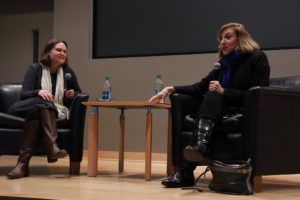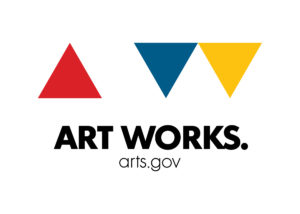by Kathy Dismukes
On Saturday, February 17 WIFV co-hosted with the Film & Video Studies Department at George Mason University a fascinating session with one of the top directors working today, Lesli Linka Glatter. Attendees at the GMU’s Founders Hall event in Arlington were treated to an intimate conversation with Glatter and insider clips from her work on preeminent shows like Homeland and Mad Men.

Carletta S. Hurt, President of Women in Film & Video, opened the program by introducing Megan Holley, who interviewed Glatter. Holley is a screenwriter and editor best known for writing the charming film, Sunshine Cleaning. An up-and-coming director as well, she is being mentored by Glatter and shadowed her on the first two episodes of Season 7 of Homeland. Holley started the interview with a heartfelt expression of thanks for Glatter’s generosity. What follows are highlights from the program that incorporate questions from Holley and audience members.
Glatter started her career as a dancer and choreographer and was able to choreograph for some top companies, including several in Asia. While based in Japan, one day she ran into an extraordinary man whose story inspired her to make her first movie. Though she knew nothing about movie making, she had a vision and the drive to make it happen. The resulting short, Tales of Meeting and Parting (1984), was nominated for an Academy Award and led her to change careers entirely. (Check out her early career in her own words in this 2016 Elle article.)
Glatter was a co-writer on the film, which enabled her to see what it was like to be a writer. She discovered she wanted to understand what every role in a production was like. Upon entering an AFI Directing Workshop for Women, she was able to work on ten other women’s films and make that happen—even gaffer work. She also took an acting class where one of her teachers was Joan Darling, a renowned director (Mary Tyler Moore Show, M*A*S*H), actor, teacher, and WIFV friend who has led sessions at Script DC for several years.
Having acquiring the baseline knowledge to be certain she could be helpful to everyone on set, Glatter set her sights on directing. As luck would have it, none other than Steven Spielberg had seen Tales of Meeting and Parting and tapped her to work on his series, Amazing Stories. Yes, when he called she thought it was a joke! One of the first episodes she directed was 1986’s “No Day at the Beach,” which involved a WWII sea battle sequence, complete with destroyers and marines in LST’s storming a beach under vicious fire.
To tackle the project, she employed the choreography skills she uses in all her directing. She noted that, even if the scale is huge, it’s still about moving things through space. We watched that sequence, which blended stock footage with live action seamlessly. Glatter advised that when it comes to shooting action, don’t be scared. Know what your objective is and plot out in a logical way how you’re going to get there. The journey may be bumpy or circuitous, but you can get there if you’ve planned it out step by step.
Glatter next showed us an example of directing when you have limited action and space. We watched the raucous cocktail party scene in the acclaimed “Guy Walks Into an Advertising Agency” Mad Men episode (Season 3, Episode 6). The scene, which she shot in one day(!), is an example of how she both uses the space that she has and builds suspense when there is limited action. The audience observes usual naughty goings on and an interesting interaction between Joan Holloway (Christina Hendricks) and Peggy Olson (Elizabeth Moss). No one saw it coming when someone rode a John Deere tractor into the suite. And certainly no one saw it coming when the driver rode over a guy’s foot, mowing off toes and splattering blood all over partiers. Glatter won a DGA award and was nominated for an Emmy for that episode.
Next, Holley asked about Homeland, winner of 54 awards and 163 nominations to date. Glatter has been nominated for and has won a slew of those for her work as director on Homeland and recently as executive producer. She talked about how she is able to shoot an episode in 10 days: you have to know what the key scenes are and you have to move through them quickly. This enables you to have time to troubleshoot problems that inevitably arise. On that note, she said you don’t have to have all the answers, but you have to know what’s working and what’s not. Glatter shared that her directing philosophy is that each shot must further the story. And don’t you love her editing decision process: when deciding, choose whom (which character) you want to be with in a particular moment.
As an example of the way she works with actors, she showed part of an intense, brutal 40-page scene in “Q&A” (Season 2, Episode 5) where Rupert Friend (as Peter Quinn) interrogates Damian Lewis (as Nicholas Brody). Friend (on his first day of shooting!) was struggling. Glatter decided that since the scene was already so dramatic, the best way to sustain and even heighten the emotion was to have him be more still. His stillness revealed his power.

The challenges women in media face came up many times during the program. Glatter said that when she was in the dance world women were everywhere. When she got started in the media industry, she was struck immediately by the dearth of women in above-the-line jobs. And, yes, she actually heard a male executive say one time, “Yeah, we hired a woman once. It didn’t work.” She lamented that we are still talking about this kind of inequity in 2018. She has been emphatically doing her part all along and for many of her shoots has a promising woman director shadow her.
Recently Glatter launched NBC’s “Female Forward” Directors Initiative in partnership with NBC President Jennifer Salke. The high-profile program, which aims to level the playing field in scripted TV series directing, started accepting applications from female directors for the 2018-19 season last month. Ten participants will shadow a series director for three episodes, then will direct at least one episode. Glatter said they’ve received more than 1,000 applications.
Want to advance in directing? Follow Lesli Linka Glatter’s career, and check out these tips gleaned a most excellent program.
LESLI LINKA GLATTER’S SUCCESS TIPS
- Get baseline knowledge. Try out as many different roles as you can on a film production so you can appreciate everyone’s perspective, level of effort, and problems that arise. This includes writing and taking an acting class or two.
- That said, if you’re new to the industry, you must also figure out what area you want to be in, build skills in it, and stay focused on it.
- You may not be a choreographer, but what unique thing do you bring to a production?
- When preparing to direct a scene, think things through and be highly organized.
- When blocking, use the space you’re in and try thinking of everything involved as moving through that space. Storyboarding every single shot will help you develop this skill.
- Storyboarding anything with action in it will help everyone else on set see clearly what you want to happen.
- In production design, what’s important to a director is what’s interesting in the frame and how it advances the story.
- Make sure you’re open to the magic that can happen on a set. Serendipity can be very freeing.
- When you’re watching a scene that isn’t working, listen to your instincts. Don’t shut them down.
- Don’t be afraid to be simple.
- Be a storyteller. Pick up your phone and go shoot things. Practice using your phone to tell a story.
- One of Glatter’s mentors, director George Miller, advised her to watch a lot of classic movies like Treasure of the Sierra Madre. He would ask her how she would shoot certain scenes. You can do this, too.
- Use social media to build community, raise your profile, and support other women media makers.
- Use Twitter, and find and use hashtags like #FemaleFilmmakerFriday. Here’s one of Glatter’s Twitter posts using that hashtag: “It shouldn’t be harder for our daughters to direct than for our sons, it should be an equal playing field. It’s time that this is no longer an issue, the time is NOW!!!@SHO_Homeland”
- Include lots of behind-the-scenes material to build interest in your project.
- Hire women for as many roles as possible on your own productions.
- Women don’t get many second chances. You’re judged faster. Know your stuff, but admit when you don’t know something, too. That shows confidence. Fear is the biggest killer of creativity.
- Be tenacious. You may hear a billion no’s, but it only takes one yes.
Lesli Linka Glatter is a top director with more than 100 hours of episodic television under her belt. In addition to Homeland and Mad Men, her directing work includes The Newsroom, The Walking Dead, Justified, Ray Donovan, Masters of Sex, Nashville, True Blood, The Good Wife, Weeds, House, The West Wing, NYPD Blue, ER, and the original Twin Peaks. (David Lynch is also a mentor.) Glatter serves on the Board of the Directors Guild of America and is an advisor at the Sundance Directors Lab. She has received the Dorothy Arzner Directing from WIF LA and the Franklin Schaffner Award from AFI, and she recently became a member of the Academy of Motion Picture Arts and Sciences.
Megan Holley is a writer and editor known for Sunshine Cleaning, which starred Amy Adams, Emily Blunt, and Alan Arkin. Based in Richmond, Virginia, Holley has written scripts for Fox 2000, Paramount Vantage, and Showtime, and is currently writing on a feature film project for J.J. Abrams’s company, Bad Robot. She is currently gaining directing experience, helped greatly by shadowing Lesli Linka Glatter on the first two episodes of Homeland’s Season 7.
Kathy Dismukes is a consultant specializing in fundraising, partnership building, and community outreach for films and nonprofits. She has been a WIFV member since 2007 and served for two terms on the board of directors, including as VP of Development and Treasurer.
















